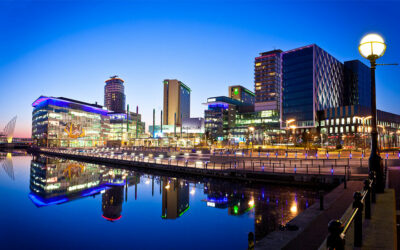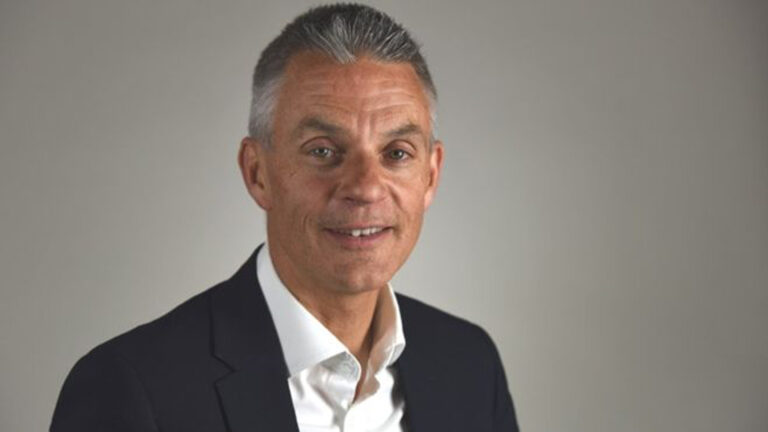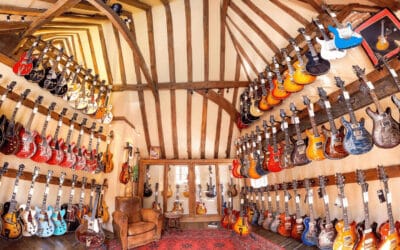This morning BBC Director General, Tim Davie, announced the corporation’s biggest transformation in decades, including major investment outside of London.
This is the speech he gave staff:
Good morning. It was six months ago that I stood in Central Square in Cardiff, new into the job, and proud. Schools were gearing up for the Autumn term, crowds were watching pre-season football matches, and there was hope for better times. Thanks to your work, the BBC was already proving its worth and we set a clear course to focus on value to all our audiences; to fight for universality; to fight for the BBC.
Of course, since then, we have been through the biggest challenge faced by families and society for generations. An endurance test, a year since we asked most of you to work from home. It has put pressure on everyone, and directly affected so many people across the BBC.
But this crisis has done something else: it has re-emphasised why we work here and why our work, together, is of such value – to families, to democracy, to our culture, to our economy, to our communities, to the UK and to the world.
Throughout these dark days, quite wonderfully, we, you, have performed brilliantly, delivering immense value to audiences. All this while coping with some significant reforms as we modernise the organisation. It has been humbling and rewarding for me to lead during these tough times. I have seen, in person, and through hundreds of zoom calls, countless examples of kindness, collaboration, excellence and humanity. Thank you.
So today, as sunshine, literally and metaphorically, begins to emerge, let us take stock. How have we done in building value for all licence fee payers? What is the plan to help not only the UK re-emerge strong from the pandemic, but also tackle the BBC’s central challenge: that of remaining relevant in a digital age?
Let’s look at the last six months.
We set a clear strategy: deliver value for all, by focussing on impartiality, high impact content of quality, a world class online offer, and maximum commercial returns. How are we doing?
Firstly, our reach has been strong. 90% of adults are using the BBC weekly.
News – local, regional, national, international – has done an outstanding job delivering impartial output. Landmark reports from hospitals, the story of the vaccines, assured analysis of the Brexit agreement, coverage of a tumultuous US election, plus unforgettable international reports from places such as Myanmar, Yemen and Iraq. And I am just scratching the surface.
Reach of BBC News is up in the UK to 86% a week from 81% a year ago.
I want to pay a particular tribute to colleagues who have faced increasing pressure in the course of simply doing their jobs. Whether that be here at home or in places like China where staff face daily challenges in delivering fair, balanced reporting, or those facing utterly unwarranted online abuse. I know I speak for all of us when I say we are here to support you.
Beyond news, we have seen teams deliver content of the very highest quality despite some enormous challenges. Radio networks, local and national, have delivered landmark work, and ground-breaking initiatives like Make a Difference. BBC Sounds has hit record numbers.
On television and iPlayer we have delivered hits like The Serpent and award winning work like Small Axe, landmarks docs such as Can’t Get You Out Of My Head, and we are seeing huge audiences come to shows like Strictly, Drag Race UK, The Repair Shop, Top Gear and Countryfile, complemented by amazing moments of sport such as the FA Cup or the 6 Nations.
Overall viewing to the BBC is up 8% year-on-year in both January and February – with iPlayer delivering record numbers.
Of course, we delivered, in lightning-fast time, Lockdown Learning which embodied the best of the BBC attracting nearly six million to Bitesize in a week. And we have just responded, once again, to the needs of families with a strong catch-up learning offer.
Alongside this, our commercial subsidiaries have worked tirelessly to mitigate the impact of the crisis. We’ll get results later in the year, but I think we will beat our initial post-Covid forecasts, and deliver a profitable year.
We have also implemented our new over-75s licence fee policy professionally and are ahead of our targets.
Meanwhile we have been active in reforming the organisation. I know that the leadership team and I are asking a lot, and that does mean cuts in some areas and changes in others.
We have begun to simplify things. We reduced the Executive Committee from 17 to 11 as promised; formed a new, single, aligned Content division, began re-structuring Design and Engineering, slimmed the News Board and made changes in English Regions. These are tough choices. Our only aim is to act clearly and fairly, strengthening the BBC by using the limited resources we have as wisely as possible.
I did say in September that we would need to be a smaller, more efficient organisation. Through voluntary redundancy and the reforms that we have already announced, the public service BBC is smaller by more than 900 people than a year ago.
Also, we have begun stripping away bureaucracy. I would ask everybody at every level to play their part and lead by example. At Executive Committee we have reduced paperwork by over 30%. I am encouraging you all to deliver clear, no-nonsense decision-making, reducing meetings, and removing long-form paperwork.
In terms of creating a more diverse, inclusive BBC, each division now has specific targets as we push to hit 50/20/12 overall. Our recently announced target that every production we commission will include at least 20% from diverse backgrounds is another step forward.
And we have set a 2030 net-zero target to take a clear and strong position on sustainability.
Finally, we are rolling out simple things to ensure that everyone gets a proper feedback and development. Leaders must carry out bi-annual conversations with their team on performance and development. This is non-negotiable. We will be tracking all leaders, in terms of how they are delivering this, and their targets on Diversity and Inclusion.
So a lot of work through tough times, thank you.
Now let’s move to the future.
As I set out in September, with the growth of well-funded global players the jeopardy for the BBC remains high – but the case for it is compelling.
We are beginning the discussions with the UK Government for the licence fee which will take us to 2027. We have a strong argument.
The BBC is an essential part of our culture and democracy, a critical catalyst that drives the creative economy. We work with more than 14,000 suppliers, and support more than 50,000 jobs.
Research shows audiences continue to value us – support for the BBC’s mission and purposes and willingness to pay remain high.
Our case is further strengthened by your work over the last few years in making us demonstrably more efficient. As you know, it has not been easy. We have faced a 31% cut since 2010 and are delivering nearly one billion pounds of savings. According to Deloitte, our overheads are now in line with the top 25% of comparable companies.
Importantly we have also increased commercial income, delivering on our five-year target of returns to the BBC of £1.2bn. All of this has helped us cope with a market where many costs, such as premium programming, have been inflating fast.
So we have proven that we can do more for less, but that can only be stretched so far.
But a compelling case for sustained investment is only as good as the future plan. So what will we do?
First of all, as I said at the start, we remain 100% focussed on audience value. Our strategy is clear and unchanged. However, we have identified five areas where we can respond to the needs of the audience, and bring value to them as we emerge from the pandemic.
These ideas are directly linked to our purposes and emphasise our unique position as an institution that can do good: for audiences, for society, for our culture and for our economy.
Those areas are:
- Getting closer to audiences across the UK, its Nations, regions and communities.
- Protecting and nurturing democracy and civil debate, through impartial news and information.
- Stimulating the UK creative sector, through distinctive, high-impact content.
- Learning, education and skills for all.
- Delivering impact across the world, tackling misinformation and reflecting UK culture and values.
We will share more proposals in these areas in coming weeks but today, I want to focus on how we continue to build value for all our audiences across the UK. (MAP)
We start from a position of strength. The BBC does more than any other broadcaster to reflect the whole UK.
This role is becoming increasingly valuable as huge new global players bring more non-UK content to audiences. We produce around 22,000 hours of new British content every year – not including our Nations and regions output – compared to around just 200 made by the US streamers.
But we need to do more if we are to stay relevant and represent a UK that is changing fast, and where too many big editorial and creative choices are still rooted in just one part of the UK. Authentic, passionate storytelling from across all our Nations, and from all its diverse communities, is what will truly make the BBC different from anyone else. People must feel we are closer to them.
Our ‘Across the UK’ plan will make a decisive shift in our footprint. Over the next six years we will recreate the BBC as a genuinely UK-wide organisation with a stronger creative presence across the whole country. This shift will create a much more distributed model that moves not just people, but power and decision-making to the UK’s Nations and regions. It is the right and fair thing to do.
This plan, while good for audiences, will also help us build more world leading creative hubs, attracting diverse talent and stimulating sector growth.
Taken together, our proposals mean the BBC will cumulatively spend at least an extra £700m outside London by 2027/28. We estimate they will generate an additional economic benefit of over £850 million.
Here is an outline of our proposals, which represent a minimum in terms of what we want to achieve:
– Firstly, our plans for video. For the first time in our history, we will make the majority of network TV beyond London. We will set a target of at least 60% of network TV commissions, by spend, to be made across the UK by the end of the Charter, up from 50% today.
As part of this, we will grow our portrayal and representation of audiences across the UK. Over the next three years, over a hundred of our new and returning scripted titles will portray the lives and communities of audiences outside London, of which at least 20 will reflect Scotland, Wales or Northern Ireland. We will also double the number of co-commissions between our Network and Nations teams across Factual, Drama and Comedy.
We will reallocate funds to deliver two new long-running drama series – one from the North of England and one from a Nation – and rebalance our commissioning model to situate more decision-making outside London, including expanding the Writers Room in Salford and creating new commissioning roles in each Nation.
– Secondly, our plans for audio. We will implement a similar ambition, with 50% of radio and music spend to be outside London, up from around 40% today. Each network radio Controller will have at least one commissioner based in one of our hubs around the UK. Over time, Radio 3 and 6 Music will be rooted in the North of England while continuing to source live music and talent from across the country. The Asian Network will be brought together into one base in Birmingham and BBC Audio’s Science Unit will move to Cardiff. Over coming years, at least one daytime strand on each of Radio 1, 1Xtra and 2 will move outside London, and Radio 4 will move a number of factual strands. The Concert Orchestra will be re-based outside the M25.
– Thirdly, our plans for news. As part of the broader plans to modernise news that Fran will be sharing with the News teams today, we will locate five of our new story teams around the UK. The Climate and Science team will move to Cardiff; the Technology team to Glasgow; Learning and Identity and part of the new UK Insight team to Leeds. While we will expand our radio base in Salford by locating our Business and Long Form audio teams.
We will move Newsbeat, the Asian Network news team and parts of our data team to Birmingham as part of an exciting local plan for the region which includes the creation of a new, vibrant production hub.
Next, we will invest in BBC local.
We want to transform the quality and depth of our online reporting across the regions, with a new network of over 100 digital reporters to bring us closer to some of the UK’s most under-served communities. We will add up to six new peak-time BBC local radio opt-outs in communities such as Bradford, Sunderland and Wolverhampton.
We’re going to move local news and content right to the heart of our online portfolio. Front and centre – not hidden away – across BBC iPlayer, BBC News, BBC Sport and BBC Sounds.
Then, as a first step to ensure more of our long-running strands are not just based in W1A, the Today programme will be co-presented from outside London for at least 100 episodes a year. Radio 4’s PM will be presented regularly from different locations, including BBC local radio stations. Building on changes already made Newsnight will be presented from different bases throughout the year. Morning Live will be presented from Salford.
Also, we will make Salford the main base for our digital and technology teams, a global centre of excellence, supported by digital teams across the UK. We will create more than 100 digital engineering jobs outside London to support our News product development and online editorial teams.
We will expand the BBC Studios bases in Bristol, Cardiff and Glasgow, and build our new Children’s commercial production base in Salford. BBC Studioworks will expand its physical studios operations in Glasgow, and explore other partnerships beyond the M25.
Finally, we will double our commitment to apprentices, supporting 1,000 apprentices in any year. We want to pilot an Apprentice Training Agency in the West Midlands so we can maximise the impact we can have on the local creative economy. More details of this will be shared shortly.
I understand that you will want much more detail. We will make sure you have clear and transparent communication through divisions over the coming days. I know reform can be unsettling, but the challenges for the BBC are real, and we must act now. We are publishing a short summary today so that you can read the details.
Our aims are clear: together we want to build a BBC that gives our audiences even more value; an even more diverse, creative organisation; and a thriving creative sector. We want to be a post-Covid success story admired worldwide.
So, thank you, for delivering in these tough times. These moments prove that after 99 years, in these days of intense competition, the BBC’s time is now. We have an ambitious and exciting plan.
There is no doubt, a strong BBC is good for the UK and the public alike. It is a successful, creative organisation. It is like no other on earth.
So let’s continue to make the case, together. Day in, day out.
Thank you.










